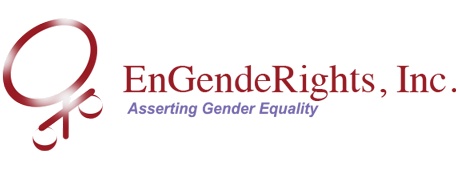About EnGendeRights
EnGendeRights has a long track record in championing the rights to equality and non-discrimination of women and lesbian, gay, bisexual, transgender, and intersex (LGBTI) persons through its domestic and international legal and policy work, research, publication, training, and impact litigation. EnGendeRights has actively advocated for the adoption of laws, policies, and even international conventions and regional human rights mechanisms upholding the rights of women and rights based on sexual orientation, gender identity, and expression (SOGIE).
Safe and Legal Abortion
These resource materials discuss the public health and human rights issues related to the antiquated and restrictive abortion law in the Philippines. The resources also highlight the Philippine state obligations under international law to decriminalize abortion and provide access to safe and legal abortion as recommended by various United Nations treaty monitoring bodies.
Women's Rights through UN Submissions
These resource materials discuss the public health and human rights issues related to the antiquated and restrictive abortion law in the Philippines. The resources also highlight the Philippine state obligations under international law to decriminalize abortion and provide access to safe and legal abortion as recommended by various United Nations treaty monitoring bodies.
Access to Misoprostol
Misoprostol (commonly known as Cytotec) is a life-saving drug included in the 21st World Health Organization (WHO) Essential Medicines List for management of incomplete abortion, miscarriage, and treatment of PPH. Misoprostol is also one of the 13 life-saving commodities for Women and Children along with implants and emergency contraception. The registration of misoprostol can save many women’s lives. A woman who experiences PPH can bleed to death in just two hours.
Divorce
These resources highlight the urgent need to pass a divorce law in the Philippines. Divorce, as other concerns related to marriage, procreation, to beget children or not, contraception, and abortion, are covered by the constitutional right to privacy (Carey v. Population Services International), hence, such personal decisions preclude governmental interference.

